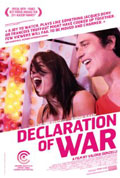
Directed by
Valerie Donzelli
100 minutes
Rated M
Reviewed by
Emma Flanagan


Declaration Of War
Synopsis: Two young Parisiens, Romeo (Jérémie Elkaim) and Juliette (Valerie Donzelli), meet, fall in love, move in together and have a baby, Adam, all in short order. While Adam is still an infant it becomes obvious that something is not quite right; he has not started to walk and he develops a swelling on one side of his face. A doctor diagnoses a brain tumour, which may or may not be fatal. Thus begins the parents’ fight to save their child’s life.
A story about a child suffering from cancer is not one in which you would expect to find a combination of hipsters, a groovy musical score, a baby and an abundance of cigarettes. But Declaration Of War brings you all that, and more. Former real-life couple Elkaim and Donzelli wrote the screenplay, which is based on their own experiences as parents of Gabriel (here called Adam), who appears briefly in the film, aged eight. As writer, director and actress, Donzelli shows courage and confidence in bringing this personal tale to the screen.
The film opens with a hospital scene of Adam, aged eight, having an MRI. Knowing that he has survived removes what would have been a heavy weight from the rest of the story and allows the film-goer to experience the struggle with some sense of ease.
Donzelli then brings us scenes from a carefree, earlier time, where Romeo and Juliette are engrossed in each other. Their Paris is a sunny place with bicycles, baguettes and ubiquitous cigarettes, the two beautiful leads surrounded by equally attractive friends and eccentric family members.
Life as they know it ends when Adam arrives; the hapless parents can’t cope as this creature takes over their lives. There are several entertaining scenes reflecting the shock of new parenthood, especially the visit to the paediatrician for advice about how to get Adam to sleep for more than one hour at a time.
The amusing start to parenthood is replaced by a sombre mood when a brain tumour is diagnosed. Then hospitals become sterile institutions, where getting basic information is a battle with bureaucratic staff and the wait for treatment to take effect is agonisingly long.
Not surprisingly, the acting of the two leads is steeped in authenticity. Declaration Of War is told like a fairytale, with two occasional narrators; a device that usually grates but here, works. Key to the success is the use of music, which is an eclectic selection, evidently based on Donzelli’s listening choices at the time the original events took place. I was reminded of the recent Romantics Anonymous, another film where a lead breaks into song, although here the original piece by Donzelli and Elkaim is used to bring Romeo and Juliette together symbolically at a time when they are physically and emotionally apart.
Want something different?





